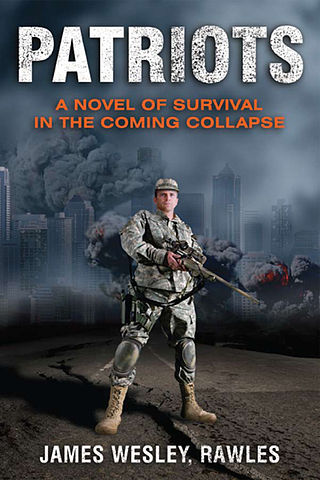Reginald Bretnor was an American science fiction author who flourished between the 1950s and 1980s. Most of his fiction was in short story form, and usually featured a whimsical story line or ironic plot twist. He also wrote on military theory and public affairs, and edited some of the earliest books to consider SF from a literary theory and criticism perspective.
Survivalism is a social movement of individuals or groups who proactively prepare for emergencies, such as natural disasters, and other disasters causing disruption to social order caused by political or economic crises. Preparations may anticipate short-term scenarios or long-term, on scales ranging from personal adversity, to local disruption of services, to international or global catastrophe. There is no bright line dividing general emergency preparedness from prepping in the form of survivalism, but a qualitative distinction is often recognized whereby preppers/survivalists prepare especially extensively because they have higher estimations of the risk of catastrophes happening. Nonetheless, prepping can be as limited as preparing for a personal emergency, or it can be as extensive as a personal identity or collective identity with a devoted lifestyle.

Karl Hess was an American speechwriter and author. He was also a political philosopher, editor, welder, motorcycle racer, tax resister, and libertarian activist. His career included stints on the Republican right and the New Left before embracing a mix of left-libertarianism and laissez-faire anarcho-capitalism, a term which is attested earliest in his 1969 essay "The Death of Politics". Later in life, he summed up his role in the economy by remarking "I am by occupation a free marketer ."

A survival kit is a package of basic tools and supplies prepared as an aid to survival in an emergency. Civil and military aircraft, lifeboats, and spacecraft are equipped with survival kits.
Kenneth W. Royce is an American author who primarily writes under the pen-name of Boston T. Party. He has written non-fiction books that offer a libertarian stance on privacy, police encounters, tax resistance and gun politics. His books are published by Javelin Press, which only publishes these works. He has written one fiction novel, Molôn Labé!, and is one of the founders of the Free State Wyoming project. In 2005, Royce was interviewed by Larry Pratt of Gun Owners of America on the nationally syndicated Live Fire radio show, about the Free State Wyoming project. He also speaks at Libertarian conferences.
Dean Charles Ing was an American author, who usually wrote in the science fiction and techno-thriller genres. His novel The Ransom of Black Stealth One (1989) was a New York Times bestseller. He wrote more than 30 novels, and co-authored novels with his friends Jerry Pournelle, S. M. Stirling, and Leik Myrabo. Following the death of science fiction author Mack Reynolds in 1983, Ing was asked to finish several of Reynolds' uncompleted manuscripts.
Jared Paul Stern is an American writer who currently serves as the Executive Editor for Maxim Magazine, where his byline has appeared since 2015. He had previously served as editor, publisher, photographer, designer, reporter and columnist for the New York Post and other publications. He contributed to the popular "Page Six" column for more than 10 years.
Bruce D. Clayton is a noted forest fire and biological control ecologist as well as being the author of several books of interest within the survivalist movement.
Kurt Saxon was an American writer, radio host, survivalist and the author of The Poor Man's James Bond, a series of books on improvised weapons and munitions.

Clayton E. Cramer is an American historian, author, gun enthusiast, and software engineer. He played an important early role in documenting errors in the book Arming America by Michael A. Bellesiles, a book that was later proven to be based on fraudulent research. His work was cited by the United States District Court for the Northern District of Texas in United States v. Emerson, 46 F.Supp.2d 598. His research also informed the Supreme Court decision in the Second Amendment cases District of Columbia v. Heller and McDonald v. Chicago. He holds an MA in history from Sonoma State University. He currently resides in Horseshoe Bend, Idaho, near Boise.

In the survivalist subculture or movement, a retreat is a place of refuge. Sometimes their retreats are called a bug-out location (BOL), a bunker, or a bolt hole. Survivalist retreats are intended to be self-sufficient and easily defended. Generally, they are located in sparsely populated outback rural areas.
Ragnar Benson is the pen name of a prolific survivalist author who specializes in preparedness topics, particularly survival retreats, hunting, trapping, austere medicine, false identification, explosives, firearms, and improvised weapons.
James Wesley, Rawles is an American author, former U.S. Army Intelligence officer, and survival retreat consultant. He is author of the best-selling thriller Patriots: Surviving the Coming Collapse, and proponent of the "American Redoubt", a survivalist refuge in the American Northwest..
John Allen Pugsley was an American voluntaryist libertarian political, economics commentator, lecturer, and best-selling author.
Portrayals of survivalism, and survivalist themes and elements such as survival retreats have been fictionalised in print, film, and electronic media. This genre was especially influenced by the advent of nuclear weapons, and the potential for societal collapse in light of a Cold War nuclear conflagration.

The Patriots novel series is a five-novel series by survivalist novelist and former U.S. Army officer and blogger, James Wesley Rawles. It is followed by his Counter-Caliphate Chronicles novel series.
Nancy Tappan was the co-editor of the newsletter Personal Survival ("P.S.") Letter in the late 1970s and early 1980s. She is now the editor of The New Pioneer magazine. Born Nancy Mack, she is the widow of Mel Tappan.

The American Redoubt is a political migration movement first proposed in 2011 by survivalist novelist and blogger James Wesley Rawles which designates Idaho, Montana, and Wyoming along with eastern parts of Oregon and Washington, as a safe haven for conservative Christians. Rawles chose this area due to its low population density and lack of natural hazards.





